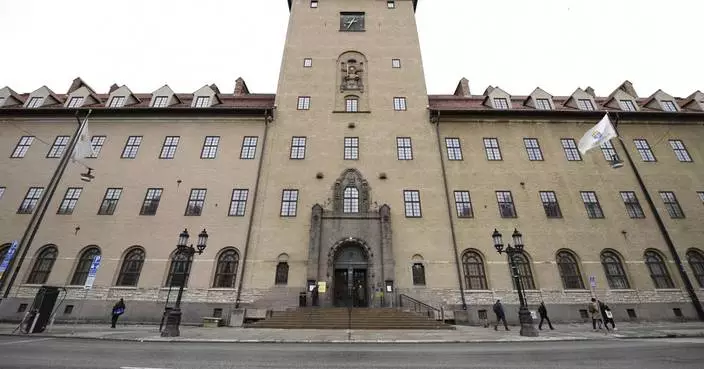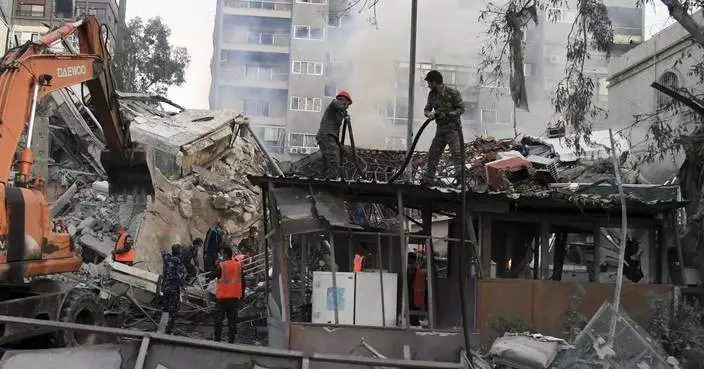Local residents pelted with shoes and stones on Friday Turkish and Russian troops who were conducting their third joint patrol in northeastern Syria, under a cease-fire deal brokered by Moscow that forced Kurdish fighters to withdraw from areas bordering Turkey.
The patrols are aimed at allowing Turkey to ensure that the Syrian Kurdish groups have evacuated the border zone. The agreement with Russia — and a separate one with the U.S. — halted the Turkish invasion of Syria last month that targeted groups it considers a security threat for their links to a Kurdish insurgency inside Turkey.
The pelting of the Turkish-Russian patrol occurred east of the border town of Qamishli, according to the Britain-based Syrian Observatory for Human Rights, an opposition war monitor, and the Kurdish Hawar news agency. Videos from the area showed men, women and children pelting armored vehicles as they drove near a cemetery before speeding away.
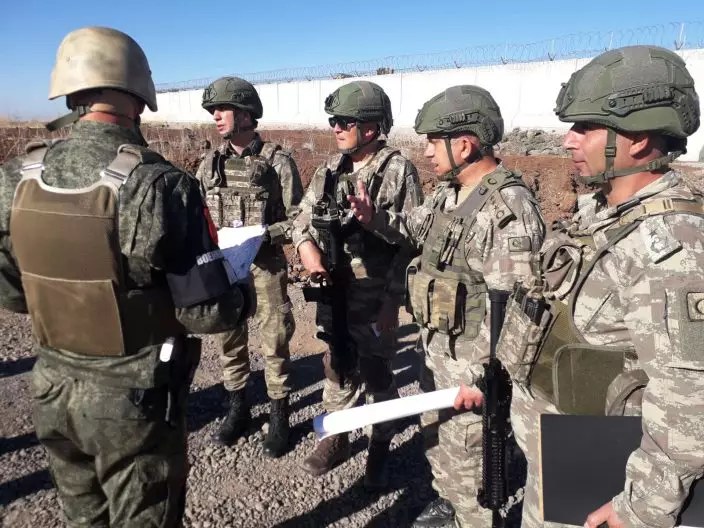
Turkish army officers, right, speak with a Russian army officer near the Turkish town of Idil at the Turkey-Syria border before they conduct their third joint patrols in northeast Syria, Friday, Nov. 8, 2019. Turkish and Russian troops are conducting joint patrols under a deal between the two countries that forced Syrian Kurdish fighters to withdraw from areas bordering Turkey. (Turkish Defence Ministry via AP, Pool)
There was no immediate comment from the Russian or Turkish military about the incident that appears not to have caused damage to the vehicles.
Turkey's Defense Ministry said the troops were patrolling a region between Qamishli and Derik, east of the Euphrates River. It said the patrols were being supported by drones, but provided no further details.
An Associated Press journalist saw four Turkish armored personnel carriers cross into Syria to join the Russian forces.
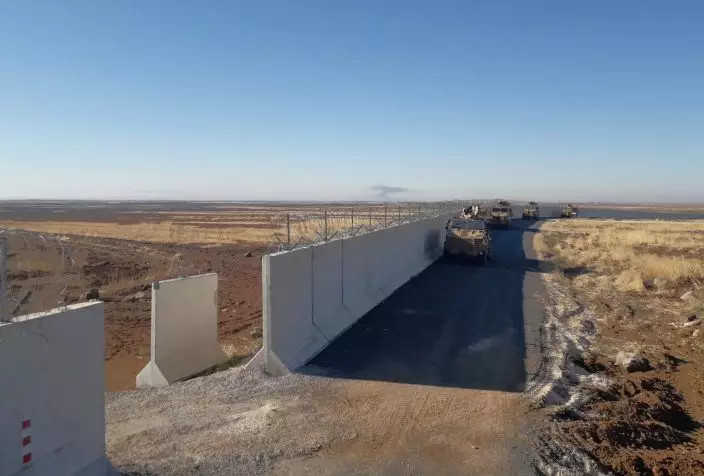
Turkish army's armoured vehicles arrive at a meeting point near the Turkish town of Idil at the Turkey-Syria border before Turkish and Russian troops conduct their third joint patrols in northeast Syria, Friday, Nov. 8, 2019. Turkish and Russian troops are conducting joint patrols under a deal between the two countries that forced Syrian Kurdish fighters to withdraw from areas bordering Turkey. (Turkish Defence Ministry via AP, Pool)
Mutafa Bali, a spokesman for the Kurdish-led Syrian Democratic Forces, tweeted that Turkish troops fired tear gas on protesters in Derik, injuring 10 people. The town is controlled by SDF and American forces, but the Turkish troops were passing through on the patrol.
Turkish President Recep Tayyip Erdogan complained this week that Syrian Kurdish fighters were still present in areas along the border, despite the separate agreements with Russia and the United States.
Erdogan also said Turkish troops were being attacked by some Syrian Kurdish fighters from areas they had retreated to, adding that Turkey would not "remain a spectator" to these assaults.
The U.N. said on Friday that 92 civilians have died so far as a result of Turkey's incursion into northern Syria. Rupert Colville, a spokesman for the U.N. human rights office, said the death toll was based on "verified incidents" that included to Nov. 5.
Also in northern Syria, the Observatory and the Thiqa news agency, an activist collective, said on Friday a suicide attacker detonated a truck outside a police station in the northern town of Rai that is controlled by Turkey-backed opposition fighters.
The Observatory said the blast killed three people, while Thiqa reported two civilian deaths.
Bombings in areas held by Turkey-backed opposition fighters in northern Syria are not uncommon. Last week, 13 people were killed in a blast in the town of Tal Abyad, which Turkish troops and opposition fighters they back captured last month.
BEIRUT (AP) — Amnesty International said Wednesday it has documented widespread abuses, including torture and deprivation of medical care, in detention facilities holding thousands of suspected Islamic State members and their relatives in northeast Syria.
The centers and camps hold about 56,000 people — the majority of them children and teens — and are run by local authorities affiliated with the U.S.-backed, Kurdish-led Syrian Democratic Forces. The SDF and its allies, including U.S.-led coalition forces, defeated the Islamic State group in Syria in 2019, ending its self-proclaimed Islamic “caliphate” that had ruled over a large swath of territory straddling Iraq and Syria.
What to do with the suspected IS fighters and their families has become an intractable issue. Many countries whose citizens traveled to Syria to join IS have been reluctant to repatriate them, as have local communities in Syria.
"People held in this system are facing large-scale violations of their rights, some of which amount to war crimes,” Nicolette Waldman, Amnesty’s senior crisis advisor, told journalists.
The United States is also responsible for the alleged violations because it played a key role in establishing and maintaining the detention system, providing hundreds of millions of dollars to the SDF and affiliated forces and regularly interrogating detainees, Waldman said.
The human rights group interviewed 126 people accused of IS affiliation currently or formerly detained, along with representatives of the local administration and aid workers.
The Amnesty report said the vast majority of detainees are being held “indefinitely, without charge or trial, in violation of international human rights law and international humanitarian law,” while those who have been tried were, in many cases, convicted on the basis of confessions extracted under torture.
The alleged abuses include “beating, stress positions, drowning, electric shocks and gender-based violence,” including a male detainee who said he and others had been sodomized with broomsticks by guards, the report said. Detainees were also deprived of food, water and medical care and subjected to extreme cold and heat in overcrowded cells, with some allegedly dying of suffocation, it said.
The report added that many of the approximately 14,500 women and 30,000 children held had been victims of human trafficking, including women who were forced to marry IS fighters and minors who were forcibly recruited by the group, and that local authorities had failed to set up a “mechanism to identify trafficking victims” and protect them.
The report also criticized the practice of forcibly separating adolescent boys — some as young as 11 or 12 — from their mothers and placing them in rehabilitation centers indefinitely.
Amnesty called on local authorities, the U.S. government and other allies to bring the detention system into compliance with international law and urged the United Nations to work with them to establish a screening process to release all who are not “reasonably suspected” of having committed a serious crime.
The Autonomous Authorities of the North and East Syria Region, the civilian administration affiliated with the SDF, wrote in response to the Amnesty findings that it had not received any official complaints regarding torture in detention facilities and “if this happened, they are individual acts.”
The administration said it would take action against employees who committed violations if evidence is provided. It denied allegations that inmates were deprived of food, water and medical care. It acknowledged overcrowding in the facilities, which it attributed to lack of financial resources to secure larger centers.
The local authorities took issue with the allegation that people were arbitrarily detained, asserting that most detainees “are members of a terrorist organization and were arrested during the battles" and that many had committed crimes against humanity and war crimes.
The U.S. State Department said in its own response that “we share many of (Amnesty’s) concerns” and it has been working to address them. It called on the international community to “aid local entities’ management of these challenges” and for countries with citizens held in detention in Syria to repatriate them.
Waldman said she believes Washington "very likely knew about these poor conditions from the beginning."
She added: “We think that it may not be the case that they are doing everything they can. They need to accept a much greater responsibility, especially since they played such a key role in establishing the situation in the first place."
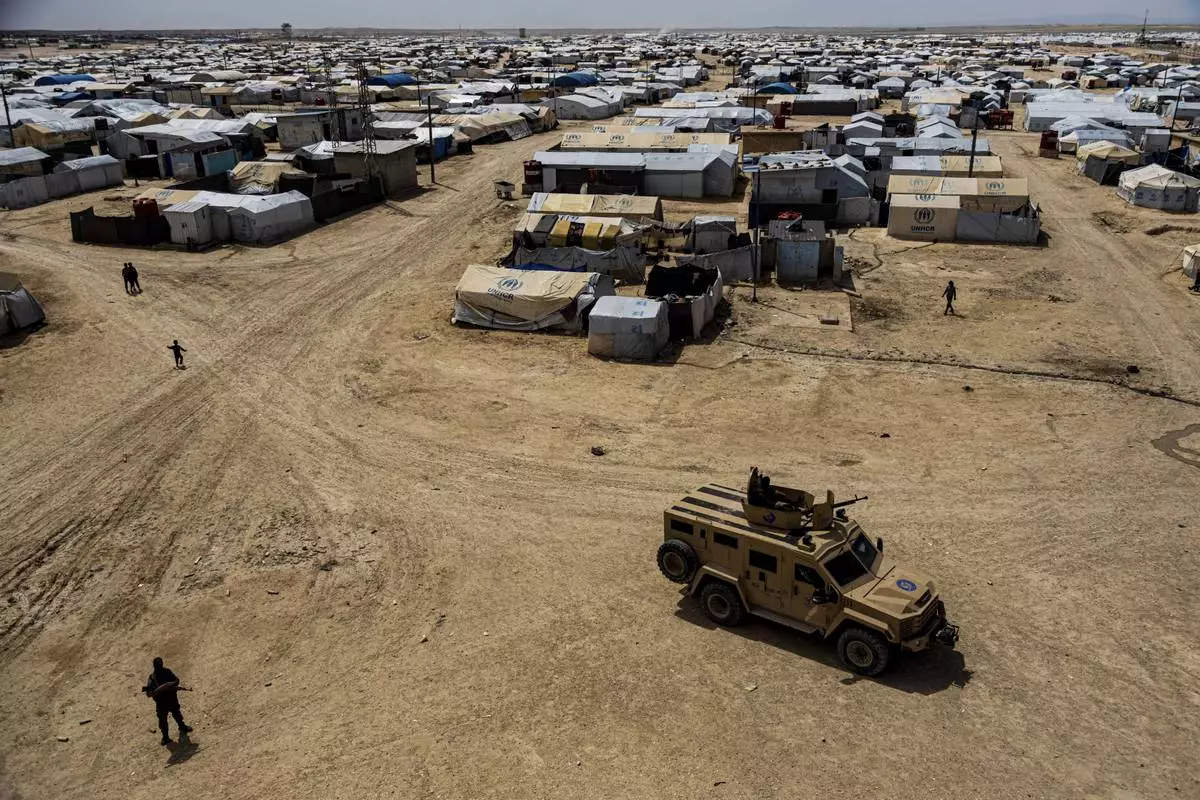
FILE - Kurdish forces patrol al-Hol camp, which houses families of members of the Islamic State group in Hasakeh province, Syria, on April 19, 2023. Amnesty International said Wednesday, April 17, 2024 it has documented widespread abuses, including torture and deprivation of medical care, in detention facilities holding thousands of suspected Islamic State members and their relatives in northeast Syria. (AP Photo/Baderkhan Ahmad, File)
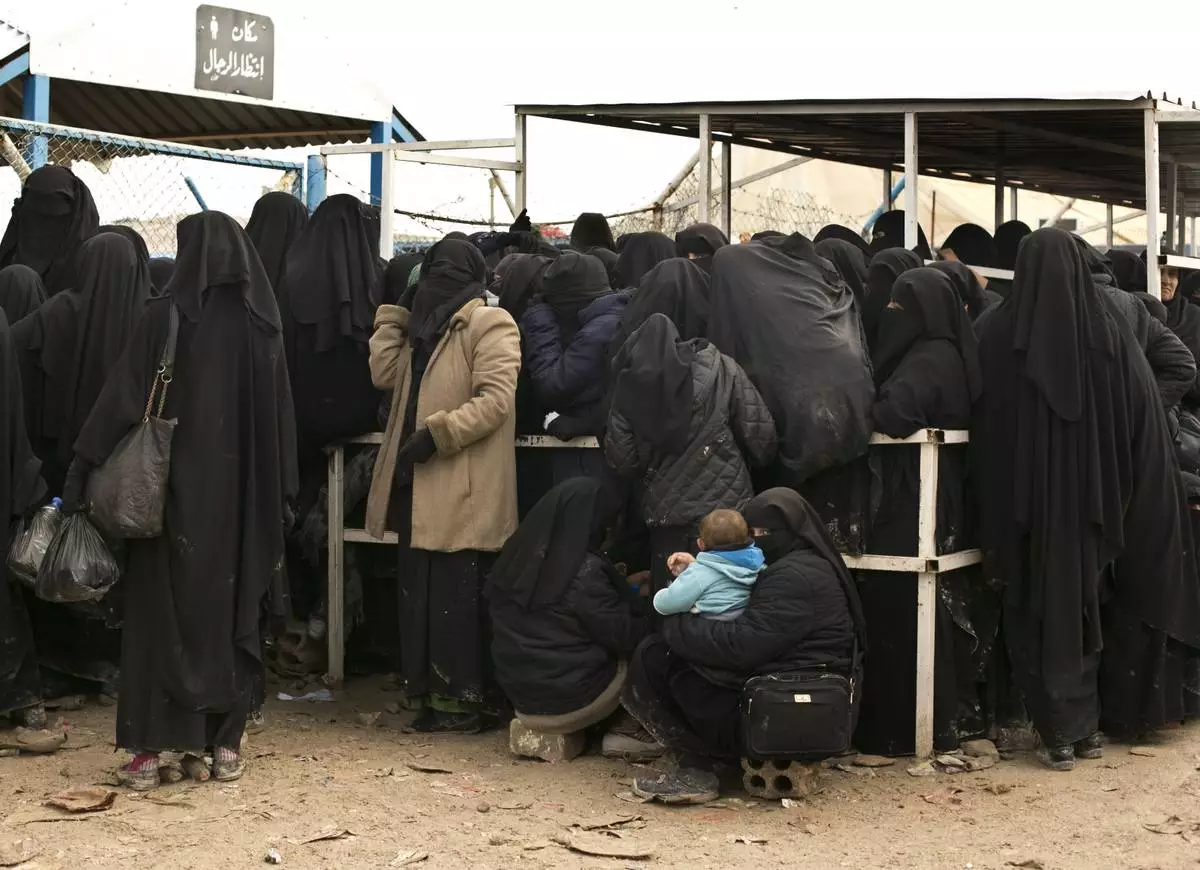
FILE - Women residents from former Islamic State-held areas in Syria line up for aid supplies at Al-Hol camp in Hassakeh province, Syria, March 31, 2019. Amnesty International said Wednesday, April 17, 2024 it has documented widespread abuses, including torture and deprivation of medical care, in detention facilities holding thousands of suspected Islamic State members and their relatives in northeast Syria. (AP Photo/Maya Alleruzzo, File)









